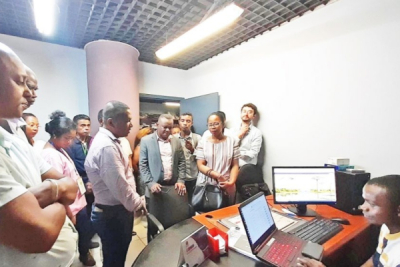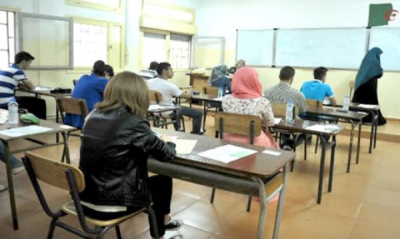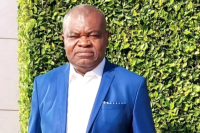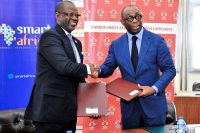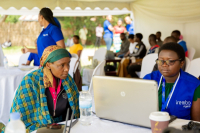
Public Management (483)
Africa has many assets, including its young population, to become a leader in the field of artificial intelligence. While some countries are slow to adopt it, others are stepping up their efforts to take full advantage of it in the coming years.
The United Nations Educational, Scientific and Cultural Organization (UNESCO) is to support Morocco in promoting digital transformation and artificial intelligence. The Director of UNESCO's Maghreb office, Eric Falt (photo, right), discussed the subject on Friday, June 16 in Rabat with Ghita Mezzour (photo, left), Morocco's Minister for Digital Transition and Administrative Reform.
"This meeting was an opportunity to study ways of strengthening cooperation with UNESCO in fields linked to digital transformation and artificial intelligence. I also stressed, in passing, the importance our country attaches to digitization and enhanced adoption of modern technologies in various fields,” Ghita Mezzour wrote on Twitter.
The global AI market is growing by leaps and bounds. Like several countries around the world, Morocco has accelerated the deployment of this new technology in several sectors. By mimicking human cognitive activity, artificial intelligence is able to assist in a great number of tasks. As such, it has a promising future and represents a huge opportunity for the country. However, it is essential to prepare the ground for the use of this technology in all fields, and even to participate in its development in both the public and private sectors.
Together with UNESCO, Morocco will work to promote digital transformation and harness the potential of artificial intelligence in the country. The UN organization has also pledged to support the Kingdom in its efforts to promote research, innovation, and the responsible use of digital technologies.
According to data from Tratica, a US market intelligence firm focused on human interaction with technology, AI is expected to generate nearly $90 billion in profits worldwide as early as 2025.
Samira Njoya
The digital revolution underway on the African continent presents huge opportunities. However, the ecosystem needs to be developed for countries to be able to leverage it for socioeconomic development. Hence the partnership between countries for a stronger and more resilient ecosystem.
Egypt and Algeria want to intensify their cooperation to develop their respective digital sectors. On Monday, June 19, Algeria's Minister of Post and Telecommunications, Karim Bibi Triki (photo, left), and his Egyptian counterpart, Amr Talaat (photo, right), held talks to this effect in Cairo.
According to a press release issued by the Egyptian Ministry of ICT, the two officials discussed avenues to boost cooperation in the field of communications and information technology.
"In-depth discussions were also held on ways to advance cooperation and the exchange of experiences in a number of areas related to postal services, digital infrastructure, telecommunications regulation, the data center industry, the development of the information technology industry, and support for technological innovation and entrepreneurship," the release informs.
At the same time, the two countries announced plans for the installation of two new submarine cables, which would establish a stronger link between Egypt and Algeria. The cables are expected to become operational by 2025. The aim is to increase the number of direct submarine cable connections to four, providing optimum access to the broadband network.
The new network will enable operators in both countries to develop a range of broadband-based services. According to Mr. Karim Bibi Triki, the new collaboration also aims to encourage the younger generation to set up their own businesses.
Samira Njoya
Africa's digital revolution allures investors and cybercriminals alike, presenting both prospects and risks. In response, numerous countries are ramping up security measures to bolster trust in their information and communication systems.
South Africa and France have signed a cooperation protocol agreement to combat cybercrime and enhance anti-corruption efforts. The agreement, signed by South African Justice Minister Ronald Lamola and French Minister for Europe and foreign affairs Catherine Colonna on Monday, June 19, aims to bolster South Africa's Special Investigating Unit (SIU) by establishing an anti-corruption academy in Tshwane. This academy will benefit the SIU, as well as other law enforcement and anti-corruption agencies within the Southern African Development Community (SADC) and beyond.
The collaboration focuses on enhancing the SIU's cyber-forensic investigations, financial crime expertise, and analytical skills. Ronald Lamola highlighted that this training initiative will bring the country's forensic cyber capabilities up to global standards, essential for addressing transnational cyber threats effectively. "This kind of cooperation will be of great value and help to enhance our skills to deal with cybercrime in the country," said Lamola.
Lamola also emphasized the vital role of this collaboration in fortifying South Africa's cybercrime-fighting prowess and revitalizing investor confidence. With cybercrime incidents on the rise, it is crucial to ensure a secure digital environment. During a hybrid information session hosted by the Council for Scientific and Industrial Research (CSIR) on April 4, 2023, Billy Petzer, research group leader, highlighted that cybercrime causes a significant loss of R2.2 billion to the South African economy annually, emphasizing its substantial impact.
Catherine Colonna, the French Minister, also expressed optimism about the partnership's benefits for South African citizens and the broader SADC region. The SIU has already gained expertise through exchanges with French professionals, with 22 trainers now capable of instructing other investigators.
She also stressed the importance of further collaboration and knowledge sharing in the field of cyber investigations. The agreement represents a significant stride in strengthening cyber forensic capabilities and anti-corruption measures, to protect citizens and foster a secure digital environment in South Africa and the SADC region.
“Since the very early stages of our cooperation, members of the SIU have been to France and have had opportunities…to see and experience the French expertise in the field of mostly cyber investigations. I call for those exchanges to grow,” she said.
Hikmatu Bilali
In Madagascar, the lack of newborn registration is a nationwide problem. By leveraging new technologies, the government wants to address the problem soon.
On Friday, June 15, the authorities of the urban commune of Toamasina in eastern Madagascar launched the trial phase of the digitized civil registration and identity system.
The new solution, which has been two years in the making, will be launched in the next few days in Toamasina, and by the end of 2023, it will be launched in several other communes in the country.
“... The official launch is scheduled for the end of June. Digitizing civil registration data means that birth information can be stored securely, to protect it from fire and loss,” said Volana Rakotonirina, Director General of the National Civil Registration Center at the Ministry of the Interior and Decentralization.
In Madagascar, as in many African countries, the identification of individuals remains a real problem. According to UNICEF data, nearly a quarter of children under the age of 18 in Madagascar have no birth certificate, i.e. some 2.5 million children. An estimated 1 million adults are unregistered and therefore invisible. The reasons for this shortfall lie partly in ignorance of the procedure, but also in structural problems such as administrative malfunctions.
Thanks to the new system, hospital data will be transferred directly to the communes, and the information will be validated by the registrar. Maternity wards will be equipped with connected tablets for this purpose. The aim is to interconnect at least 30 communes by the end of the year.
This digitization project is part of the Malagasy Digital Governance and Identity Management Project (Prodigy), launched in 2019 and financed by the World Bank. The project aims to increase inclusive access to legal identity for all Malagasy citizens and improve access to and the quality of key public services.
Samira Njoya
Internet is nowadays considered an essential tool for most of our daily activities. The service, which demonstrated its importance during the Covid-19 crisis, is also considered a threat depending on the context in which it is used.
Fixed and mobile Internet connections were severely disrupted throughout Algeria on Sunday, June 11, because of the 2023 baccalaureate exam. Social networks, instant messaging, and certain websites were blocked to prevent fraud during the exam.
The disruptions are set to continue till the end of the exam, on June 15. It is a government decision that follows previous years’ pattern when the government cut internet access on exam days and exam sessions.
Internet disruptions affect more than 49.45 million fixed and mobile subscribers (according to the latest figures from the telecom regulator ARPCE). This represents 91.31% of all internet users in the country where the service is essential for cabs, delivery drivers, restaurants, online clothing stores, etc.
In Algeria, the baccalaureate exam period is always a frustrating time, with Internet access restrictions and the resulting disruption to business activities. This is because the government has taken the radical decision to limit access after several unsuccessful attempts to prevent exam malpractices. Years earlier, the government had tried less radical measures such as electronic jammers installed in examination centers to prevent candidates from accessing the Internet.
In the diaspora, some wonder whether an outright cut is the best way to go. For them, a thorough search of candidates to detect wireless communication devices before allowing them in exam rooms and sector jammers might be more than enough.
Samira Njoya
The decision is an important step to ensure education while waiting for things to get back to normal after the pro-Sonko protests.
Senegal’s public universities will adopt distance learning for some time, Minister of Higher Education Prof Moussa Baldé announced on RFM radio’s Grand Jury show last June 11.
According to the government official, the universities of Dakar and Ziguinchor were ransacked a few days earlier, so the rectors of the universities would meet to reflect on how to make a shift to distance education with “hopes that after Tabaski [June 28-29, ed note] face-to-face learning will resume.”
The University of Thiès will follow the same agenda, he added. The decision to shift back to distance teaching is taken just days after a series of violent demonstrations following the conviction of opposition leader Ousmane Sonko. During those demonstrations, infrastructure and universities were ransacked, including six faculties of the Cheikh Anta Diop University (UCAD).
Three years ago, when the coronavirus pandemic was raging, Senegalese universities tested distance learning using platforms developed by the government. They allowed learners to take courses from home, familiarizing themselves with new learning methods.
Students can take courses remotely thanks to investments being made by the government since 2013. In 2019, the Smart Education project was launched in the framework of the 2019-2035 Plan for an Emerging Senegal. The project aims to deploy tech platforms to improve teaching and learning at universities, secondary and primary schools. Over time, the government has enhanced investments in that cause.
Samira Njoya
Agriculture is one of Côte d'Ivoire's major economic sectors, and the world's biggest cocoa and cashew producer has been multiplying efforts to foster partnerships and develop this sector.
The Ivorian capital, Yamoussokro, will house a prestigious digital farming school in the coming months. The project was officially kicked off last Friday, June 9, by OCP Africa and Mohammed VI Polytechnic University (UM6P).
The new school will, according to the Minister of Higher Education, Adama Diawara, "produce high-quality human resources who will support the country's development, by tackling agricultural issues with innovative solutions, creating jobs for our graduates, and boosting entrepreneurship.
OCP Africa & @UM6P_officiel posent la 1ère pierre de la #Digital #Farming School à Yamoussoukro, en collaboration avec @inphbpolytech. Avec son approche pédagogique axée sur du Peer Learning et du Learning by farming, cette école, 1ère du genre en Afrique, sera adossée à une… pic.twitter.com/TmOfDxL014
— OCP AFRICA (@OCP_Africa) June 9, 2023
The upcoming school is valued at $4.9 million and is expected to open in the next 10-12 months. It wil be the first of its kind in Côte d’Ivoire.
The first batch of trainees should regroup 100 young AgriTech enthusiasts, according to a press release issued by OCP Africa. They will learn how to use digital tools and new farming technologies.
Also, the school will be attached to an experimental farm where the trainees will be able to put in practice and share what they learn.
The project is one of Morocco's many significant projects in Côte d'Ivoire - Projects initiated by King Mohammed VI, to bolster cooperation between the two nations.
For Côte d'Ivoire, however, the new digital farming school results from the government's efforts to develop agriculture. A sector, which, according to the African Development Bank (AfDB) is set to grow by 6.7% in 2022-2023.
Samira Njoya
The first edition of the digital summit GITEX Africa was held from May 31 to June 2 in Marrakech, Morocco. During the technology trade show, which brought together tech companies and start-ups, government delegations, global investors, international speakers, and tens of thousands of technology executives from more than 100 countries, We Are Tech Africa spoke with Freddy Mpinda, advisor to the Congolese minister in charge of the Digital Sector.
WAT: President Félix Tshisekedi expressed his ambition to leverage digital technologies to improve integration, good governance, economic growth, and social progress. What are the main projects underway to achieve this?
Freddy Mpinda: Indeed, the DRC has undergone a decisive digital turning point since the arrival of President Tshisekedi, who is advancing his vision to leverage digital technologies for integration, economic growth, and good governance. This vision is set out in the National Digital Plan (PNN) Horizon 2025 and implemented in a government program called the Digital Transformation Program (PTNRDC), implemented by the Ministry of Digital Affairs. The PTNRDC focuses on 8 priority projects (the digital code, e-Gouv (e-Citoyen, e-Cadastre), National Data Center, Government Intranet, Electronic Payment Aggregator, Tele-medical expertise, e-Education).
Currently, we have several projects underway. We have infrastructure projects because we're a big country and we want to connect as many Congolese as possible. We've expressed the need for 50,000 km of fiber optics because recent studies have shown that over 40 million of the country's 100 million people are not connected to anything. After all, mobile operators are set up in economically profitable regions, and rural areas are sometimes left out. So, we need fiber optics to connect as many Congolese as possible. Apart from this, we have e-governance projects, projects to teach digital skills to the youth and to support entrepreneurs, build data centers, deploy the national bar-coding platform that generates codes with the national prefix (605), and so on… So, projects are ongoing and we are trying to implement them with several partners.
WAT: As you mentioned earlier, DRC has a 2025 digital plan. Can you tell us the goals of that plan and what the government hopes to achieve by that timeline?
FM: Well, the plan has a deadline, which is 2025, because we’ve learned from other African countries and we wanted a time-bound plan. If you go through it, you will notice that it mentions that in 2025, it will be reviewed, amended, and relaunched. We're well aware that the projects we're working on, particularly infrastructure, can’t necessarily be completed by 2025. Nevertheless, we decided to launch as many projects as possible and take stock in 2025. So 2025 will be an evaluation phase. We'll see what has worked, and then we'll roll out a new plan. The Ministry of Digital Affairs has already achieved a great deal in a very short period, notably the adoption of the Digital Code, digital norms and standards in the DRC, the Startup Act (a law dedicated to start-ups, with a wealth of incentives and opportunities, editor's note), and the recruitment of career civil servants to the General Secretariat for Digital Affairs.
WAT: Over the past two years, your country has signed several partnerships with Estonia and China. What has the DRC gained from these partners, and what has it given in return?
FM: Well, that's easy to say. What did the DRC give in return? The DRC has given everything in return and provided the main inputs for the digital revolution. We hold almost 60% of the world's raw cobalt, Coltan, which is used in cell phones, and Niobium... We have all these metals. The real question is what the DRC is going to get in return because we've been contributing our minerals to this fourth revolution for many years now. And that's why our policy is to be open. We discuss as much with the Chinese, the Estonians, the Emiratis, and also with our African partners like the South Africans, the Zambians, and so on. What we need is to transform locally some of our raw materials, which today are just potential wealth-generating sources but are not yet generating real wealth. We have joint projects with African countries and countries around the world, but projects that must be profitable for the DRC, because, over the past 60 years, we've been giving away our raw materials and receiving very little. As far as digital transformation is concerned, feedback is vital for us and our partners. There's no need to reinvent the digital sector.
WAT: What does the DRC stand to gain from digital development?
FM: Digital technologies should be seen as a tool. The proof is that [the Ministry of Digital Affairs] is a transversal ministry, in other words, one that serves everyone. Today, at the GITEX Africa panel, I pointed out that the priority is to solve Africa's main problems. Digital technology is a powerful tool for solving our problems. Our top priority, as the Covid-19 crisis has shown, is to produce our food as close as possible to consumers. So for us, agriculture is a priority. The second priority is education. In March and April 2020, we found ourselves with 18 million Congolese schoolchildren forced to stay at home, with no possibility of learning remotely. So for us, digital technology must enable distance learning. The same goes for healthcare. We found ourselves with a pandemic overnight, and we had to find respirators, masks, and so on. Digital technology must help us improve our health strategy, particularly our vaccination strategy. We need to know who's been vaccinated and who hasn't. We're a fortunate country. Fortunately, we are a country that has already experienced a pandemic before, Ebola. Digital technology must be at the service of health and epidemiological surveillance. Agriculture, education, and health are our priorities.
WAT: In short, you mean that digital technologies are tools to enable DRC to achieve its sustainable development goals and more. But do you have the digital skills needed to keep up?
FM: when you read the plan, you will notice that it is based on four pillars namely infrastructure, content, applications, and governance and regulation. We do have a fifth pillar, which is education, but we decided that it couldn’t be a pillar by itself because for instance, to develop infrastructure, we need education. We need engineers, we need technicians, and so on. In terms of content, those who will develop applications, i.e. coders and so on, need education. In terms of application use, those who will be working to enable the State to become increasingly digital need education. Civil servants need to be brought up to speed. Governance regulation needs education. So education is everywhere. In reality, our plan is based on four apparent pillars and one invisible pillar, which is education. The Minister for the Digital Economy has made the development of digital skills a major focus of his action. The development of Congolese digital skills is a recurring theme in the latest memorandum of understanding signed in China by the two digital ministers.
Interview by Adoni Conrad Quenum
Digitization is a major development challenge for WAEMU countries. Despite the ambitious national strategies and progress made, digital transformation in the region is still lagging compared to the global performance.
On Wednesday, June 7, the West African Development Bank (WADB-BOAD) and the Smart Africa Alliance signed a framework agreement to accelerate digital transformation in WAEMU countries.
The agreement was signed by WADB President Serge Ekue (photo, right) and Lacina Koné (photo, left), Director General of the Smart Africa Alliance, in Lomé, Togo.
The new agreement aims to support the development of the e-commerce industry in the WAEMU region and support the implementation of financial inclusion projects to advance subregional integration in line with Point 1 of Djoliba, the WADB’s 2021-2025 strategic plan, reveals Togolese media outlet Agence togolaise de presse.
"The vision is to transform our Africa, to ensure that all our populations can project themselves into the future in a very concrete way by using digital technology in various fields, notably agriculture, and energy," said Ekue.
Since its creation in 2014, Smart Africa Alliance -comprising 35 out of the 54 African countries- has been working to make digital transformation a tool for economic development by involving the private sector and member countries in concrete initiatives.
With this agreement, the WADB partners with an alliance whose aim is to leverage digital technologies for development in Africa. The two parties will implement several projects to support innovation. They will disseminate startup toolkits in member countries, enhance capacities and upskill actors in the WAEMU region while scaling up the Smart Africa Digital Academy (SADA).
Samira Njoya
In recent years, Rwanda has implemented numerous reforms to advance economic competitiveness. One of the strategies it employed to achieve this feat is the provision of quality services and customer care in the public and private sectors.
The Rwandan government will digitize more than 400 additional administrative procedures by June 2024. The plan was announced by ICT Minister Paula Ingabire, during a session on ICT development with the Senate on Thursday, June 1.
The new administrative procedures will be added to the 103 services already digitized and available on the Irembo portal set up by the government for this purpose. According to Minister Ingabire, the next stage of digitization will be transformational. It will involve digitizing all remaining services, "enabling time efficiency and removing unnecessary costs and processes that come with paperwork or transport as citizens make trips to different government offices.”
To achieve this goal, Rwanda will be supported by a range of partners, including the French Development Agency (AFD), which granted a €37 million loan to support the digitization of public services and innovation in the country earlier this year.
According to Irembo CEO Israel Bimpe, the launch of the Irembo public services platform in December 2015 has enabled the processing of more than 25 million service requests to date. This has saved over 100 million man-hours for both civil servants and Rwandan residents.
The portal employs 7,700 agents in different regions of the country, and more than 1,500 government officials use it to approve and deliver necessary services. As a result, the government has been able to collect RWF 300 billion ($265 million) in service fees.
This new initiative is part of a RWF 13 billion project that began in March this year with the identification of the services concerned. The project is one of the priorities of Rwanda's National Transformation Strategy (2017-2024).
Samira Njoya
More...
Senegal wants to digitize some 700 administrative procedures by 2025. To achieve that ambitious goal, it tasked the public IT agency SENUM S.A to work with specialized partners to reach the target.
On Thursday, June 1, Sénégal Numérique SA (SENUM SA), the state agency in charge of the management of Senegal's digital infrastructure, and digital company Elm signed a memorandum of understanding in Morocco, on the sidelines of Gitex Africa.
The memorandum lays the groundwork for Elm to support SENUM SA in its mission to leverage technology to stimulate economic growth, improve public services, empower Senegal's citizens, and consequently promote digital inclusion.
"We look forward to developing digital services in Africa. This will open up expansion opportunities, provide innovative services and solutions to strengthen the digital infrastructure and meet the needs of stakeholders," said Majed bin Saad Al-Arifi (photo, left), Elm’s spokesperson and director of marketing.
As part of the partnership, Elm will create advanced digital platforms offering a diverse range of consulting services. The two parties will also build short- and long-term strategic plans to exploit the opportunities available in the market as well as define joint initiatives and projects aimed at strengthening their cooperation over the specified period.
This agreement is part of Senegal numérique SA's efforts to multiply partnerships to further develop its public services platform. For Elm, the protocol is a godsend for achieving its objectives, notably the creation of business opportunities in Africa and the expansion of its regional and international presence.
Since the beginning of the year, SENUM SA has signed several partnerships, including one with the esports promotion agency CONAPES, another one with the national statistics agency, and two others with Transnumerik.
Samira Njoya
The new law allows investors to acquire assets such as land and mining concessions using cryptocurrencies. It follows the adoption of Bitcoin as a legal tender in the country and the launch of a national cryptocurrency called Sango coin.
In the Central African Republic, the National Assembly passed, on Monday, May 29 a bill on the "tokenization" of natural resources, which allows investors to acquire assets such as land and mining concessions using cryptocurrencies.
The approval follows the adoption, in April 2022, of Bitcoin as a legal tender in the country and the launch of a national cryptocurrency (Sango Coin) a few months later. The new law "sets the framework for the use of bitcoin and Sango virtual currencies in the investment process, including by foreign nationals wishing to invest in mining, agrarian and forestry titles,” the bill reads. states
The bill adds that investors who purchase these titles "have the right to transfer all accruing annual profits abroad once they pay taxes and various duties.”
"The bill complements the law on cryptocurrencies and, by streamlining [the process], it makes it easy to raise funds for [...] the State [...] and local communities,” explained Guy Samuel Nganatoua, Chairman of the National Assembly's Economy and Finance Committee.
In July 2022, Central African President Faustin-Archange Touadéra announced that Sango coin would catalyze the tokenization of the country’s vast natural resources.
The bill that tokenizes natural resources is not supported by everyone, however. Opposition MPs on the joint commission boycotted the plenary session during which the bill was reviewed. They accused the government of facilitating the sales of the country’s natural resources to “mobs” instead of focusing on improving control to better capture revenues from those vital economic sectors.
In August 2022, the constitutional court ruled that it was “unconstitutional” to buy citizenship, e-residency, land, and natural resources in the country using Sango Coin. But, in October 2022, the president of this court, who also invalidated the presidential decrees setting up a committee to draft a new constitution, was nevertheless retired by an order of the Minister of Public Service.
Sango coin, whose launch coincided with the collapse of the global cryptocurrency market, has so far failed to attract much investor interest. The project also attracted criticisms from the IMF, the World Bank, and even the regional central bank (BEAC).
Critics deem the project unrealistic in a country where internet penetration is around 11% and the electrification rate is just 14.3%.
The United Nations now considers the Internet as a basic necessity in the same category as water and electricity. For some governments, the tool, which demonstrated its importance during the coronavirus pandemic, can become a threat to national security.
On the afternoon of Sunday, June 4, Senegal decided to “temporarily” suspend mobile Internet access. According to the Ministry of Communications and the Digital Economy, access is restricted during certain timeframes due to "the dissemination of hateful and subversive messages in a context where public order is disrupted in some areas.”
Since Thursday, May 1, riots have been taking place in several Senegalese towns. Thousands of young people have clashed with the police and gendarmerie to protest against the two-year prison sentence handed down to Ousmane Sonko, leader of the main opposition party (Pastef). The main opponent to President Macky Sall is considered by the Senegalese youth as the favorite for the February 2024 Presidential election. He was convicted for “perverting the youth” although he was brought before courts over rape and death threats charges.
For his sympathizers, the conviction which renders him ineligible for the upcoming election is a conspiracy to prevent him from running in an election in which he has a high chance of winning with flying colors.
VPNs can no longer be used to circumvent the measure
The temporary suspension affects 17,227,783 subscribers -per the latest figures from the national telecom regulator ARTP. This represents 96.78% of Internet users in Senegal, where the service is essential for cabs, delivery drivers, hairdressing salons, restaurants, online clothing stores, and so on.
In a press release, the association of ICT businesses called on the government to lift all the usage restrictions on instant messaging platforms to guarantee economic freedom since those tools are used by thousands of entrepreneurs to seek “life-saving incomes.”
The temporary mobile internet restriction comes two days after social media access was blocked in the country. The social media ban was issued to restrict the publication of mobilization calls and videos of clashes in several districts of Dakar, Ziguinchor, etc. The restrictions did not produce the desired effect, with most youth using VPNs to circumvent it.
On Friday, June 2, Proton VPN, a virtual private network service developed by Swiss company Proton Technologies AG, noted a huge 30,000% and counting increase in VPN registrations from Senegal.
"This is in line with what we've seen during unrest or geopolitical crises in recent years in Iran, Turkey, and even Russia. The figures we're seeing are comparable to those we saw in Senegal in March 2021. At that time, similar censorship led to a 20,000% increase in registrations," said the company.
Muriel Edjo
Nowadays, social networks are no longer simple chatting tools. They can become powerful propaganda tools. Fearing the use some may make of it, governments have sometimes taken extreme measures like banning those networks.
Since the night of Thursday, June 1, access to the social networks Facebook, Twitter, WhatsApp, and Youtube is restricted in Dakar and several other cities across Senegal. By the afternoon, people were already experiencing difficulties in communicating easily on these platforms. Some users thought that it was caused by network disruptions. However, the social media block was confirmed by NetBlocks, an Internet governance watchdog, on its Twitter account.
The ban comes as clashes between security forces and youth groups have escalated in several districts of Dakar, Ziguinchor, Mbour, and Kaolack since yesterday. This conflict came after the announcement, on Thursday morning, that Ousmane Sonko, president of the opposition party Patriotes africains du Sénégal pour le travail, l'éthique et la fraternité (Pastef), had been sentenced to two years in prison for corrupting the youth. Ousmane Sonko has been on trial since 2020 for rape and death threats against one Adji Sarr. He was acquitted of the rape charges and sentenced for another crime, making him ineligible for the February 2024 presidential election.
On May 8, Sonko's eligibility for the presidential election was jeopardized by an initial six-month suspended prison sentence for defamation against the Minister of Tourism, Mame Mbaye Niang.
In a statement by Interior Minister Antoine Félix Abdoulaye Diome, the social network access restrictions were to prevent "the dissemination of hateful and subversive messages". In a press release issued on Thursday afternoon, the Pastef national office called on "the Senegalese people" to "take to the streets" and asked the army and national police to join them.
By blocking access to social networks, the government wants to prevent any mobilization by Ousmane Sonko. Indeed, throughout his legal battle in the Adji Sarr case, he used those tools to rally his supporters, claiming that the rape case is a plot by President Macky Sall's government to oust him from the race for power.
Facebook and Twitter were used on several occasions to relay the demonstrations and grassroots actions carried out by his young supporters. The videos published have sometimes contributed to escalations, resulting in deaths and material destruction during demonstrations.
Muriel Edjo





